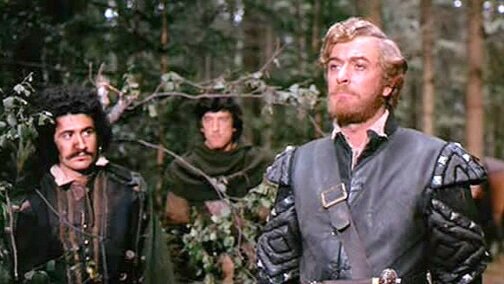The Last Valley (1971)
![]()
Country: GB/US
Technical: col/scope 128m
Director: James Clavell
Cast: Michael Caine, Omar Sharif, Florinda Bolkan, Nigel Davenport
Synopsis:
Midway through the Thirty Years War, an intellectual bereaved in the sack of his home town in Germany flees marauding troops and winds up in a remote Alpine valley, lorded over by a local burgher and a catholic priest. Relief, however, is grudgingly given and shortlived, as a mixed-faith unit of mercenaries arrives to take up winter quarters. At the risk of his own life, the civilian negotiates his own survival and the sparing of the villagers, whereupon the isolated community strikes up an uneasy modus vivendi. It is only a matter of time before outside forces, and internal allegiances, reassert themselves.
Review:
Impossible to make an intelligible film about an intractably complex war, and so this one merits some indulgence for using it to document an interesting experiment that might have taken place. Problems with the film are three-fold: the script, which is intelligent at times and turgid at others; the casting, with Sharif and Davenport looking and sounding wrong respectively; and the budget, which is too small for its ambition. The central idea of brutish soldiers learning to appreciate an Elysian paradise free from murder and rape (but not religious oppression) is well taken, and Caine's Germanic turn as the captain prepared to massacre the village at the start, but who leaves a handful of men behind to protect it at the end, is undoubtedly a highpoint. But the results are just too uneven, whether Oscarsson, the priest's, impenetrable Swedish accent and other Euro-puddingy acting styles, or the lurches in plotting, such as Gruber's sudden clemency at the end, or the ease with which the girl is persuaded to forget her love for Vogel; and we finish with a most underwhelming medium long shot of the young lovers, shrouded in fog, as if the makers simply ran out of time and money.
![]()
Country: GB/US
Technical: col/scope 128m
Director: James Clavell
Cast: Michael Caine, Omar Sharif, Florinda Bolkan, Nigel Davenport
Synopsis:
Midway through the Thirty Years War, an intellectual bereaved in the sack of his home town in Germany flees marauding troops and winds up in a remote Alpine valley, lorded over by a local burgher and a catholic priest. Relief, however, is grudgingly given and shortlived, as a mixed-faith unit of mercenaries arrives to take up winter quarters. At the risk of his own life, the civilian negotiates his own survival and the sparing of the villagers, whereupon the isolated community strikes up an uneasy modus vivendi. It is only a matter of time before outside forces, and internal allegiances, reassert themselves.
Review:
Impossible to make an intelligible film about an intractably complex war, and so this one merits some indulgence for using it to document an interesting experiment that might have taken place. Problems with the film are three-fold: the script, which is intelligent at times and turgid at others; the casting, with Sharif and Davenport looking and sounding wrong respectively; and the budget, which is too small for its ambition. The central idea of brutish soldiers learning to appreciate an Elysian paradise free from murder and rape (but not religious oppression) is well taken, and Caine's Germanic turn as the captain prepared to massacre the village at the start, but who leaves a handful of men behind to protect it at the end, is undoubtedly a highpoint. But the results are just too uneven, whether Oscarsson, the priest's, impenetrable Swedish accent and other Euro-puddingy acting styles, or the lurches in plotting, such as Gruber's sudden clemency at the end, or the ease with which the girl is persuaded to forget her love for Vogel; and we finish with a most underwhelming medium long shot of the young lovers, shrouded in fog, as if the makers simply ran out of time and money.
![]()
Country: GB/US
Technical: col/scope 128m
Director: James Clavell
Cast: Michael Caine, Omar Sharif, Florinda Bolkan, Nigel Davenport
Synopsis:
Midway through the Thirty Years War, an intellectual bereaved in the sack of his home town in Germany flees marauding troops and winds up in a remote Alpine valley, lorded over by a local burgher and a catholic priest. Relief, however, is grudgingly given and shortlived, as a mixed-faith unit of mercenaries arrives to take up winter quarters. At the risk of his own life, the civilian negotiates his own survival and the sparing of the villagers, whereupon the isolated community strikes up an uneasy modus vivendi. It is only a matter of time before outside forces, and internal allegiances, reassert themselves.
Review:
Impossible to make an intelligible film about an intractably complex war, and so this one merits some indulgence for using it to document an interesting experiment that might have taken place. Problems with the film are three-fold: the script, which is intelligent at times and turgid at others; the casting, with Sharif and Davenport looking and sounding wrong respectively; and the budget, which is too small for its ambition. The central idea of brutish soldiers learning to appreciate an Elysian paradise free from murder and rape (but not religious oppression) is well taken, and Caine's Germanic turn as the captain prepared to massacre the village at the start, but who leaves a handful of men behind to protect it at the end, is undoubtedly a highpoint. But the results are just too uneven, whether Oscarsson, the priest's, impenetrable Swedish accent and other Euro-puddingy acting styles, or the lurches in plotting, such as Gruber's sudden clemency at the end, or the ease with which the girl is persuaded to forget her love for Vogel; and we finish with a most underwhelming medium long shot of the young lovers, shrouded in fog, as if the makers simply ran out of time and money.
